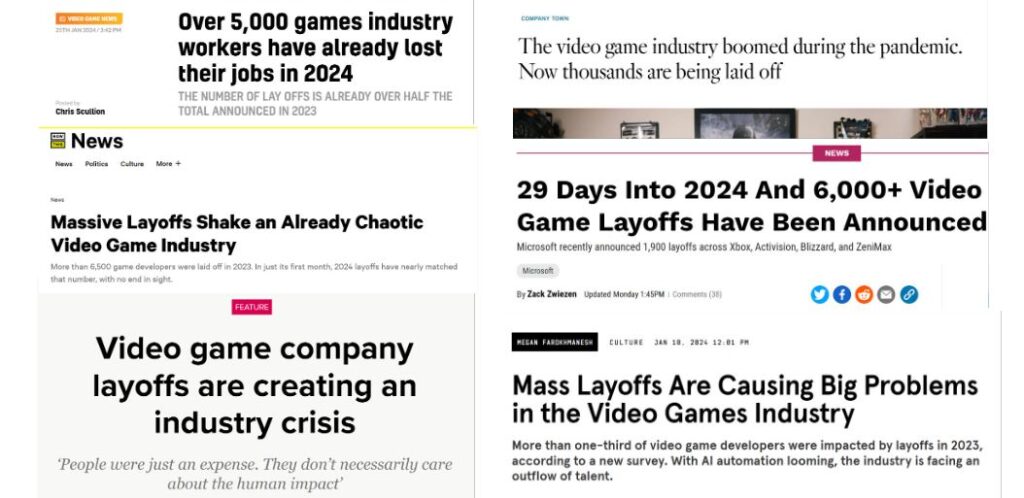At the latest GALA conference, held in Valencia, Marina Ilari and I had the opportunity to speak about the secret sauce behind our team-building strategy. Our objective was to share our approach to working with remote, distributed, and multicultural teams, and we used one of our largest in-house teams, consisting of more than 100 LQAs and coordinators, as a case study. This presentation sparked many stimulating conversations with localization and video game professionals, which motivated us to write a series of blog posts that will explore the takeaways presented that day in greater detail.
A Transitional Phase for the Video Game and Localization Industries
The video game industry and localization providers specializing in this niche are experiencing a quite painful transitional phase. In less than a year, between 2023 and 2024, we have witnessed the rise of amazing AI and technology developments and, at the same time, a massive wave of layoffs. Though not necessarily interconnected, these two developments have added unpredictability to our daily lives. Suddenly, fourteen to fifteen thousand people in the video game industry lost their jobs, and that’s not even counting layoffs by third-party service providers, like LSPs, that have also been affected by budget cuts. There are many theories about why this is happening. Probably all of them contain some fact and some fiction. But, at this point, that doesn’t matter. People matter.

So, how do we prepare ourselves?
How do we prepare our people for what’s coming next?
And, you may be wondering, what is coming next?
The thing is, we don’t know. What we do know is that there’s always a possibility of change. It can be a drastic change, like the one we are going through, or it can be a change that creates more jobs, more opportunities, new ideas. We just don’t know.
So, whatever the future might bring, we believe that we need to get ready for it today. We need to prepare our teams and put the focus back on our people.
Futureproofing: A Collaborative Effort
With the goal of keeping humans at the core, we want to share what has worked for us when futureproofing our team, and hopefully help other organizations going through the same shifts. This blog series attempts to collaborate with other remote, distributed and multicultural teams that are in formation or already set up, with the objective of safeguarding people’s well-being above all else. We hope this sparks conversations and that other teams are willing to share their best practices so that we can continue to take care of each other and prepare for a future that looks rather uncertain right now.
And, how will we do this?

Each week we’ll cover a different topic such as:
These posts will be based on our own experience building a remote and distributed multicultural team working in the video game localization field. We’ll provide suggestions or additional information from the theory available on these topics, and we’ll interview our LQA specialists, who are currently coordinating their own language teams and are putting into practice or have put into practice the different subjects we’ll cover, so readers can consider culturally diverse approaches.
What should you do now?
We strongly recommend subscribing to our blog so you don’t miss our bi-weekly posts and interviews. We hope this series sparks helpful conversations that guide you to reflect on and answer these questions:
- What else do we have the power to do/change?
- What are we missing?
- What other best practices can we implement to futureproof our teams?
- How can we keep people at the core, always?
Do not hesitate to participate in our polls and open questions. We want to hear from you, because we want to make this blog series a tool for our localization and video game industries and for all teams facing uncertainty.
And if you would like to discuss these topics further, please send me a message at [email protected]
About the author:

Angie Tapia is a professional in translation, localization, project management and language services. She holds a Bachelor of Arts in Translation and Interpreting and a Master’s in Administration and Project Management. Her career includes a pivotal role as the Head of Language Services at the Lima 2019 Pan American and Parapan American Games, where she led a team of 50 language services professionals and over 300 volunteers, providing over five million translated words and a thousand hours of interpreting. Angie’s work extends to academia, where she has served as a university professor since 2015. Currently, she channels her passion for innovation, technology and localization into her position as a Customer Success Manager at Terra Localizations, where she tailors solutions and streamlines processes for the videogame industry.
